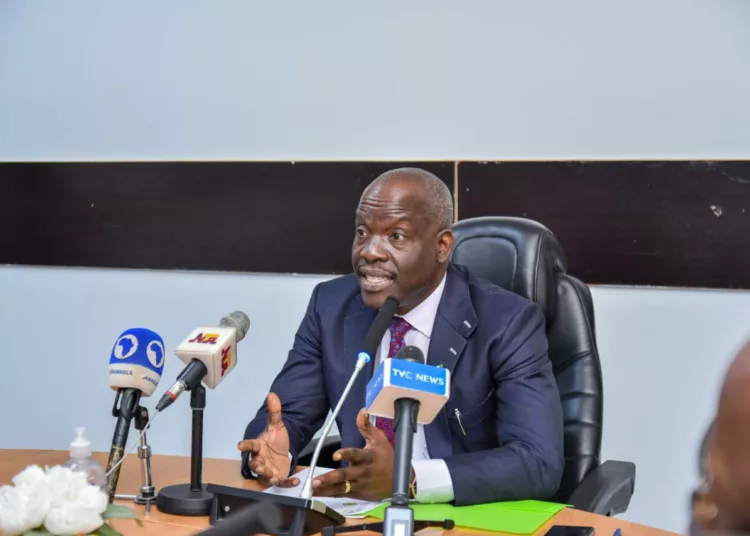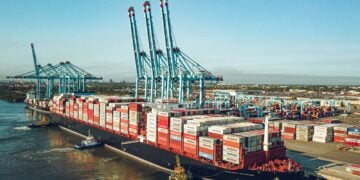The federal government has declared a zero-tolerance policy for operators who fail to comply with the regulations governing the commercialisation of gas flaring, signaling a firm stance against environmental violations and economic waste in the oil and gas sector.
Under the Nigerian Gas Flare Commercialisation Programme (NGFCP), the government aims to attract investments and develop a transparent market mechanism to allocate gas flares to competent third-party investors, using globally proven technologies to eliminate the persistent practice of gas flaring in the Niger Delta and other oil-producing regions
The Nigerian Upstream Petroleum Regulatory Commission (NUPRC), Chief Executive Engr. Gbenga Komolafe, who delivered a keynote address at the ongoing 24th Nigerian Oil & Gas Energy Week Conference & Exhibition (NOG Energy Week) 2025, stressed that the federal government has laid the right foundation for the operators to stove through the various reforms and executive orders to make the sector viable and competitive.
Komolafe highlighted the federal government’s firm stance on gas flaring commercialisation under the Nigerian Gas Flare Commercialisation Programme (NGFCP) adding that regulatory sanctions have already been imposed on defaulting producers who fail to comply with the programme’s mandates.
“Let it be clear: the Commission will not tolerate any Producer that undermines this national climate-action programme, nor will it allow unwilling Awardees to set us back.
“Regulatory action has been taken against non-compliant Producers who failed to execute agreements after several engagements,” Komolafe stated.
Recall that the federal government has committed to eliminating routine gas flaring by 2030, reducing methane emissions by 60 per cent by 2031, and monetising Nigeria’s vast gas reserves as part of the country’s gas-centric energy transition strategy.
Komolafe acknowledged the positive collaboration with many producing companies, saying, “We commend some of the producing companies for their collaboration and commitment to advancing the government’s flares-out agenda.” He noted that the Commission has worked closely with operators over the past year “to remove obstacles and foster partnerships under the NGFCP.”
He expressed optimism about the programme’s future, promising, “By next year’s NOG event, we look forward, with optimism, to showcasing operational flare capture projects that reflect our dedication to national and global climate goals.”
The CCE listed some of the transformative reforms in the oil and gas sector driven by the Petroleum Industry Act (PIA) of 2021 and recent presidential Executive Orders (#40 on fiscal incentives, #41 on local content, and #42 on cost efficiency).
Komolafe noted that these reforms have catalysed a historic energy sector transformation, with Nigeria’s production already reaching 1.7 million barrels per day (bpd) and targeted to increase to 2.5 million bpd by 2026 through the Project One Million Barrels Per Day initiative. “Through aggressive rig deployment, asset reactivation, streamlined approvals, and enhanced recovery techniques, we are scaling up Nigeria’s production efficiency and contract timelines,” he said.
He also emphasised the importance of infrastructure expansion and protection, stating, “We have approved 37 new evacuation routes and are working closely with security agencies to curb theft and improve transparency in export through the Advance Cargo Declaration System.”
Komolafe underscored oil and gas’s central role in Nigeria’s economy, contributing nearly 90% of foreign exchange earnings and 70 per cent of national revenue. Yet, he stressed that “no strategy is complete without benefits to oil-producing communities, fostering peace and social license to operate.”
On the environmental front, the Commission is spearheading a seven-pillar emissions reduction strategy, integrating emissions tracking, MRV (Measurement, Reporting, and Verification) systems, carbon capture, and climate finance access. Komolafe highlighted Nigeria’s pledge to achieve net-zero emissions by 2060 and the launch of the Upstream Decarbonisation Framework and the Decade of Gas initiative.
He said, “Nigeria is not on the sidelines of the energy future; we are shaping it. With visionary leadership, bold reform, smart regulation, and a clear net-zero path, we are offering the world a model of what pragmatic, equitable, and resilient transition looks like.”
The NUPRC is also playing a leading role in regional energy market integration through initiatives such as AFRIPERF and collaboration with the Africa Energy Bank.
Komolafe explained, “We are driving regulatory convergence, cross-border collaboration, and infrastructure interoperability to enhance domestic energy security and sustainable growth across the continent.”
Komolafe echoed President Bola Ahmed Tinubu’s call to investors: “Nigeria must not only be open for business; it must be irresistible for investment.”
He affirmed, “The foundation has been laid. Let us turn our vast energy potential into enduring performance.”





